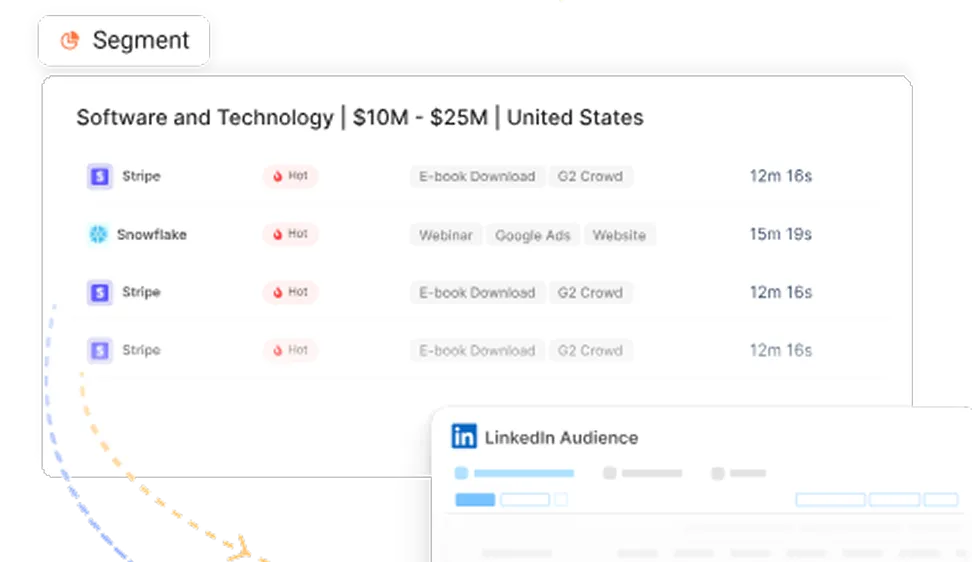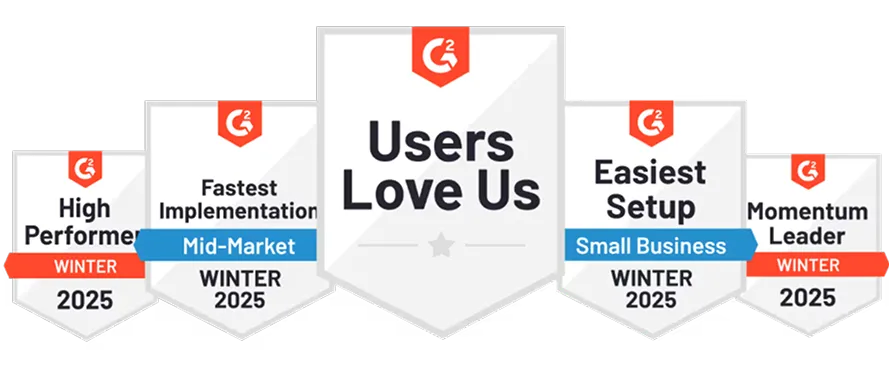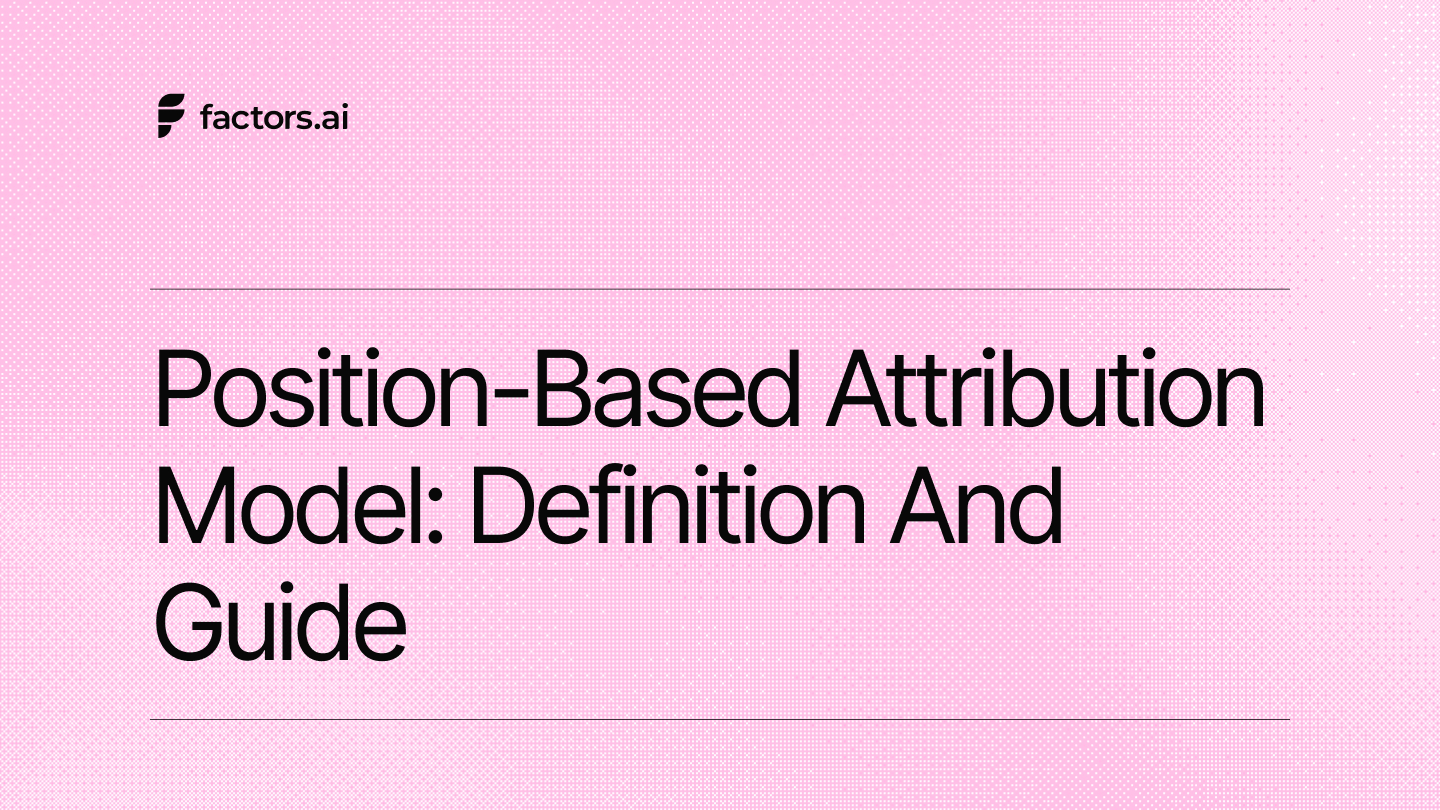Factors. ai vs Bizible: Pricing, Integration, Features and More
B2B business teams use tools like Bizible and Factors.Ai to understand marketing data. Compare their features to find the right fit for your business.
Marketing today looks nothing like it did just a few years ago. You need to keep an eye on numerous campaigns on various channels, understand where your users are coming from, what drives them, possibilities of churn, and endless optimizations. For tasks like these, companies can’t help but rely on B2B marketing tools like Factors.ai and Bizible.
Well-known in the marketing space, both of these tools come with a variety of capabilities and functionalities for analytics, attribution, personalization, and optimization to help B2B firms make better-informed marketing decisions.
But how do you know which one’s right for you?
The following blog delves into the features offered by them and a comparative analysis of their respective strengths and weaknesses in the marketing analytics field. Curious how one of these tools can become part of your marketing arsenal? In this article, we’re covering everything from the features to pricing, integrations and even reviews for both Bizible and Factors!
About Bizible
Bizible (now Marketo Measure) is a widely-used attribution tool aimed at providing B2B and B2C marketers with insights on their customer journey and revenue impact. It does so with strong touchpoint tracking and attribution modeling.
Bizible Integrations
The Adobe Marketo Measure (previously Bizible) extends its functionality to seamlessly integrate other tools to collect information on web source, medium, keyword, cookies, visitor behavior. Using this you can optimise your marketing strategies accordingly. Here are some of the tools that are supported by Bizible:
- Microsoft Dynamics CRM (for custom objects, pre-built CRM reports, templates and dashboards)
- Marketo Engage
- WordPress
- Salesforce Sales Cloud
- HubSpot Marketing Hub
Bizible Features
- Dedicated A/B testing integration, lets you track the revenue impact of your Optimizely and VWO site experiment. These experiments can provide insight to your marketing team to help optimize their campaigns and improve ROI.There are a few types of Marketo Measure A/B reports available to customers, which enable reporting on A/B Test results regarding leads, contacts, and opportunities.
- Dedicated Boomerang stage feature was designed to enhance visibility into the customer's journey, particularly for customers with extended sales cycles. Marketers are empowered by this feature to establish touchpoints at every stage transition throughout the Opportunity journey. For example, it captures scenarios where a contact progresses from MQL to SAL and subsequently returns to the MQL stage. This is known as the boomerang stage, or when contacts "re-enter the MQL stage" or "re-MQL." The Boomerang Stage feature seamlessly integrates with the Marketo Measure Custom Stages, working together to enhance the functionality.
- Multi-currency Compatibility which allows users to switch between different currencies for their reported spend and sales revenue. Currently, this feature covers these two metrics.
About Factors. ai
A compelling alternative to Bizible, Factors. ai comes into the picture as an AI-fueled marketing analytics and attribution platform that works with SME and mid-market B2B companies like Razorpay, Chargebee and Clickhouse. Not only does Factors.ai offer robust attribution capabilities, but it also provides a user-friendly interface and intuitive reporting tools. The platform is divided into 4 broad categories:
- Marketing and website analytics
- Marketing attribution
- Journeys analytics
- Account identification.
Factors. ai Integrations
Factors has the ability to connect with advertising platforms, customer relationship management (CRM) systems, and customer data platforms (CDPs). Consequently, it can be used to track user actions across various touch points on a website, analyze campaign information, and even gather data from events recorded in the CRM. This comprehensive integration enables holistic analysis and reporting of data.
Factors. ai Features
Factors.ai comes bundled with unique features that aid attribution.
- User/account timeline: showcases all touchpoints for all users across their conversion journey over a span of time presented neatly on a timeline graph. This feature helps businesses identify valuable touchpoint data for all its users that can pinpoint every single step of every user’s conversion journey.
- Customizable Stage Transitions: With this feature, users can track and optimize the customer journey by defining and customizing stage transitions that align with your unique sales cycles, allowing for granular analysis of each stage.
- User-Friendly Interface: Users can enjoy a seamless and intuitive platform that makes it easy to navigate, visualize data, and access actionable insights, ensuring effortless usage for marketers of all skill levels.
- Cross-Channel Analysis: It is also possible to analyze the performance of your marketing efforts across multiple channels, such as digital advertising, social media, email marketing, and more, to understand the synergistic effects and optimize cross-channel strategies.
How do the two compare?
Here is a table comparing the features that Bizible and Factors. ai come with:

In the next few paragraphs we will look at their strengths and weaknesses when pitted against each other with respect to integrations, attribution, onboarding and implementation, reporting quality, pricing, and privacy and compliance.
1. Integration
There are some points to consider when comparing the integration features of their tools. First off, the tools that these apps integrate with, do not completely overlap. For instance, Factors. ai does not integrate with Microsoft Dynamics Integration- Bizible does, and Bizible does not integrate with CDPs, which Factors. ai does. Second, Factors. Ai offers out-of-the-box integrations while Bizible comes with high developer dependency for tasks such as tracking HubSpot landing pages or integrating with LinkedIn.
Bizible can integrate with a wide range of applications and platforms. These popular apps span across CRM, CMS, marketing automation, email marketing, advertising platforms, web and sales analytic tools. Some of these commonly used platforms are Marketo, Google Ads, WordPress, MailChimp, Outreach and SalesLoft.
Factors. Ai can also integrate with similar ad platforms, CRMs, and CDPs. CDP helps improve data quality, identify new audiences, and connect behavioral data. At the moment, Factors can integrate with third-party CDPs like Segment.
2. Attribution
B2B marketing attribution is like detective work for marketers, uncovering the hidden fingerprints of success. It's an process that delves deep into the influence of various marketing touchpoints on coveted conversion goals, such as demos, pipeline growth, and revenue generation. The process involves employing a variety of multi-touch attribution models to evaluate and quantify the contribution of each marketing touchpoint towards achieving these objectives.
Factors. ai and Bizible both offer marketing attribution capabilities. They share a few similarities and differences.
Channels and Subchannels
Marketing Channels serve the purpose of categorizing and organizing your marketing activities for convenient reporting in both the Marketo Measure ROI Dashboard and your CRM system. Bizible offers 40 custom channels, which can be customized and renamed according to your organization's preferences. The Marketing Channel represents the broadest level of classification, encompassing various Subchannels. These Subchannels can be viewed as the specific "type" of source through which your leads are generated. Examples of Marketing Channels include Paid Search, Organic Search, Display, and Paid Social. Subchannels play a significant role in indicating the specific version or variation of the Marketing Channel used to attract leads.
Currently, Bizible offers 40 custom channels and 200 subchannels. Channels and subchannels in Bizible attribution categorize and organize marketing touchpoints, providing insights into the performance of different marketing sources. This helps marketers understand the effectiveness of various channels and subchannels in driving conversions and revenue, informing decision-making and optimization strategies.
A business growing at a fast pace might opt for more channels to avoid chances of narrowing attribution and analytics. Factors.ai attribution does not specifically use the terminology of ‘channels’ and ‘subchannels’ in the same way as Bizible. Instead, Factors.ai focuses on integrating various data sources, such as ad platforms, CRMs, and CDPs, to provide a holistic view of marketing performance and customer journeys. It analyzes the impact of different touchpoints and events across the customer journey, offering comprehensive insights into marketing effectiveness and revenue attribution.
Attribution models: Factors.ai has the capability to create attribution reports at both company and user levels, can track both website and non-website events, and has a customized dashboard that collects and visualizes all crucial data in one place. Factors.ai also delivers 9 attribution models that include influence, time-decay, U-shaped and W-shaped.
Bizible offers 6 different attribution models that can help marketers decide what touchpoints are impactful in the customer journey. These are Lead creation, First-touch, U- shaped, W- shaped, Full- Path, and the Custom model.
Attribution model funnels and metrics:
Bizible and Factors. ai both provide a range of metrics and filters to analyze attribution models and measure marketing performance. Here are some of the key metrics and filters offered:
- Revenue Attribution: Measures the revenue generated by each touchpoint or marketing source, providing insights into their contribution to the bottom line.
- Conversion Attribution: Determines the contribution of each touchpoint to conversion events, allowing you to understand which marketing efforts are driving conversions.
- Touchpoint Influence: Measures the influence of a specific touchpoint on conversions or revenue, providing a granular view of individual touchpoint performance.
These platforms also allow filters like:
- Time-based Filters: Can be used to analyze attribution data within specific time frames, such as daily, weekly, monthly, or custom date ranges.
- Revenue Range Filters: You can set filters to analyze attribution data within specific revenue ranges, allowing you to focus on different tiers of revenue generation.
The difference between the two lies in Factors’ AI- driven approach to provide attribution models. With this information, you can dynamically allocate credit to marketing touchpoints based on their actual impact on revenue and conversions, and also forecast future performance by availing predictive analytics. Factors. ai also emphasizes seamless integration with CRM systems and marketing platforms.
3. Onboarding and Implementation
Setting up Bizible requires some level of dependency on developers. You might also require technical support from your development team for processes like creating a custom model. As per reviews on g2, the onboarding process can take a few months to fully complete. On the whole, Bizible works as a solid attribution tool, but reviewers often report problems with the onboarding and implementation.
Factors offers a quicker onboarding process of under 30 minutes, without requiring heavy-duty technical assistance. Factors’ tracking script can be set up directly or through Google Tag Manager in only a few minutes. Find out more about the process here. In case you're facing any difficulties, you can also get in touch with Factors' customer support team available round the clock.
4. Analytics/Reporting
Bizible has a wide selection of drill-through data. You can access marketing reports on the revenue by channel, closed revenue, contacts created, opportunities created, closed deals etc. It provides snapshots of CRM at any point in time and the distribution of records across opportunity stages.
Factors.ai can also extract and analyze relevant data points to give you a comprehensive overview of your customer relationships and interactions.The snapshot provided by Factors.ai may include key CRM metrics and visualizations, such as pipeline value, conversion rates, sales velocity, lead distribution, and performance trends. This enables you to have a holistic view of your CRM data and track the progress of your sales and marketing activities.
Bizible and Factors.ai both give you the option to visualize marketing data the way you want. If you connect to a business intelligence (BI) platform, you can present data with more flexible visual options. Standard metrics like bounce rates and monthly visitors are available on both Factors and Bizible, when integrated with data analytics platforms.
5. Pricing
Bizible's pricing information is not available on their website. That said, according to reviews online, Bizible is 5% and 6% more expensive than the average attribution production, for small and mid sized businesses respectively.

This is not very convenient for SMEs and startups. However, according to GetApp, Bizible scores high with 4.8 out of 5 stars on the value of money rating. They allow a maximum of 25 users per plan. It is important to note that this number can vary with lower plans.
Factors. ai pricing is geared to cater to startups and SMEs. Their high tier growth plan is more affordable for these businesses and comes with customer support and functionality. They also offer specific plans that are purpose-built for your business’s unique analytical and attribution requirements. They also allow unlimited users per plan.
What is the right option for you?
Ultimately, the choice between Bizible and Factors.ai depends on your specific requirements and priorities. Bizible may be a good fit if you prioritize strong touchpoint tracking and existing integrations with tools like Microsoft Dynamics CRM and Marketo Engage. Furthermore, Bizible pricing is considered appropriately priced by users. On the other hand, Factors.ai offers AI-driven attribution models, customization options, and a user-friendly interface, making it a compelling option for those seeking a more agile and appropriate solution for startups and SMEs.
Consider your business's needs, budget, and desired features to determine which platform aligns best with your goals and will empower your marketing team to make better-informed decisions. The choice between the two depends on the specific requirements, the importance placed on factors such as AI-driven attribution, customization, predictive analytics, and user interface. Evaluating these differences can help determine which platform better aligns with your organization's marketing measurement requirements in terms of attribution modeling and the depth of integration needed. If you’re interested in seeing how Factors.ai could align with your business, schedule a personalized demo here.
Wondering how Factors fares against other top analytics tools? Here are some quick reads:
See how Factors can 2x your ROI
Boost your LinkedIn ROI in no time using data-driven insights


See Factors in action.
Schedule a personalized demo or sign up to get started for free
LinkedIn Marketing Partner
GDPR & SOC2 Type II
.svg)








.jpeg)


.avif)












